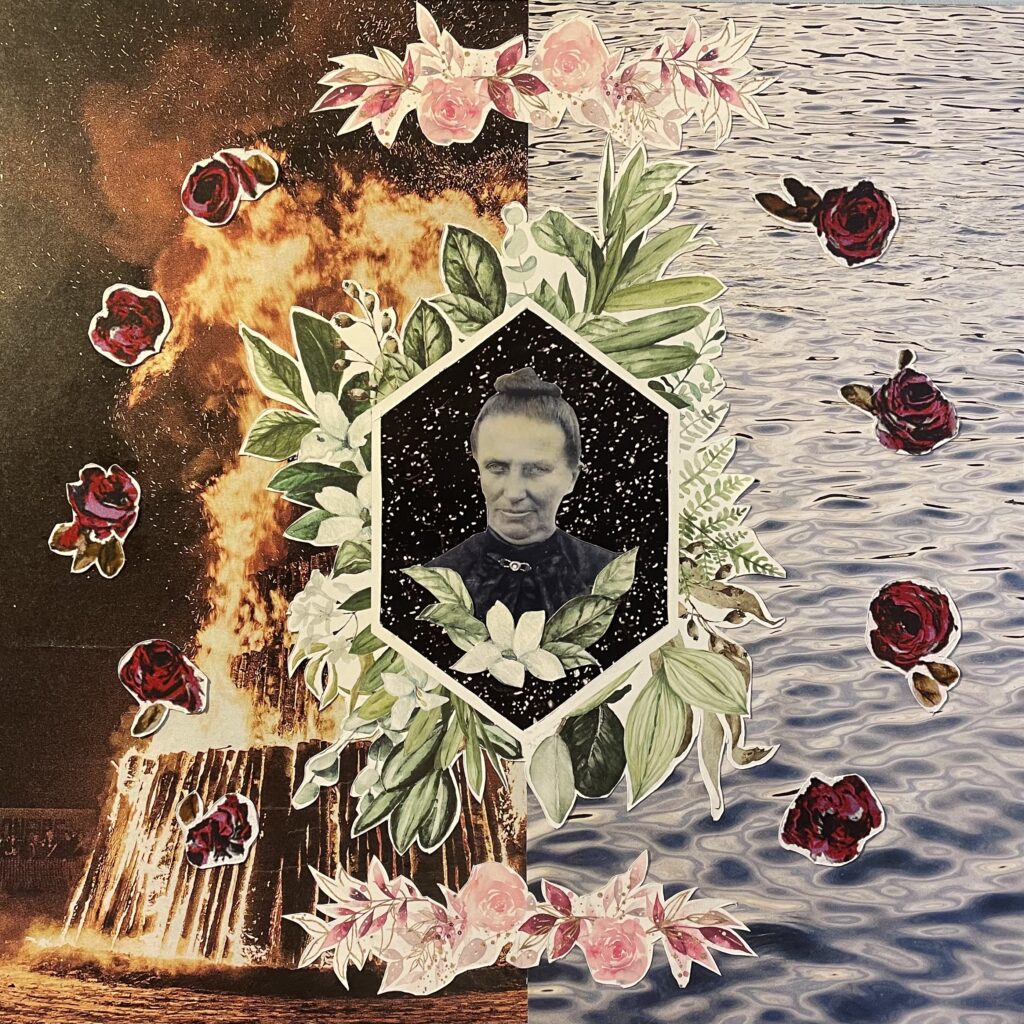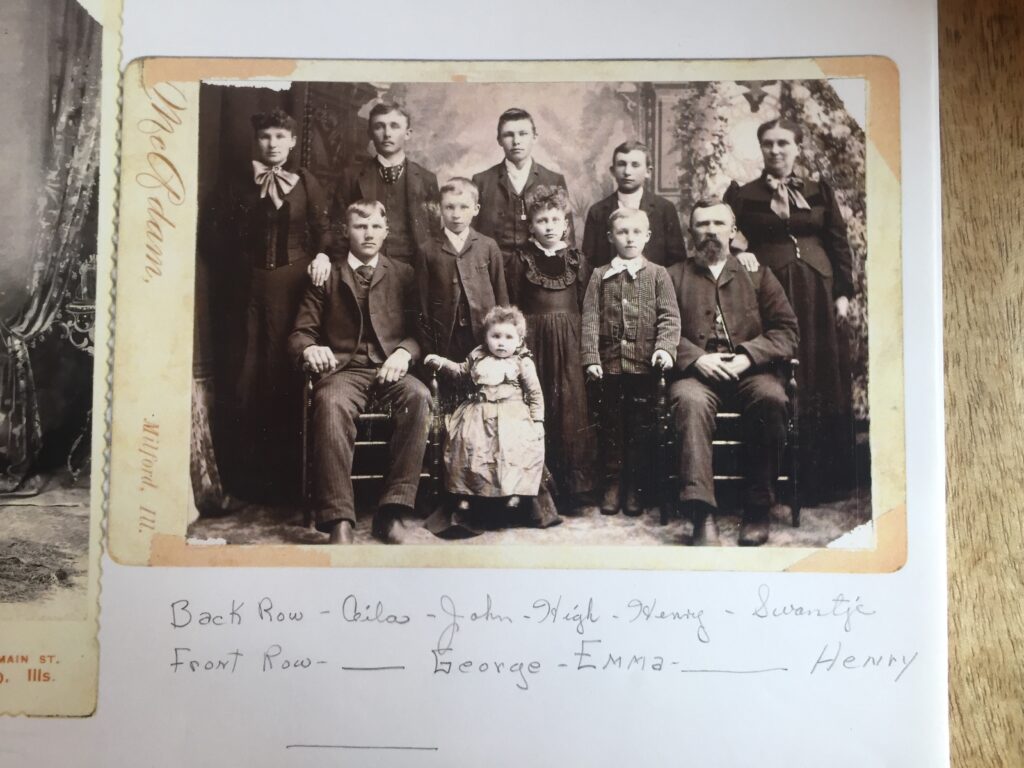I’ve been thinking a lot about forgiveness lately, what it is and what it is not. In the family, culture and religion that shaped me, forgiveness is expected of me. The paraphrased rationale that I’ve heard over and over my entire life goes, “Because you’ve been forgiven (for your sins, by God, through Jesus’ death at the hands of state, i.e. the Roman Empire), then you should forgive others too.”
That “should” is a tough one for me. In my experience, it lets too much toxicity, abuse, and violence be tolerated and hidden.

The piece above features my Great Great Great Grandma Swantje “Susie” Lena Lehnerts Hulse (b. 1848 Hannover, Germany d. 1910 Flanagan, IL, USA). She did not forgive her husband, and it resulted in his death.
I learned of her story, whispered from an aunt to a nephew, and later written in a letter to my grandmother by her cousin, the nephew:
“One night during February 1905, [Henry Johnson Hulse] went to the house where Swantje lived, wanting to see her. [They were previously divorced.] She would not let him in, so he told her he would not leave until she let him in. She refused, and he apparently spent at least part of the cold February night on the porch and in this process his feet were frozen, which resulted in his death about a month later.”
The true cause of death? The death certificate indicated his occupation was bartender and that he had died of alcoholic neuritis, caused or complicated by exposure to cold. The article in the local paper about his death said that he had been badly frozen and “suffered intensely from the effects.” It went on to say:
“[He had] great toes amputated, which only effected a temporary relief…gangrene set in and his death was not unexpected by the family. He was an aged German living in that vicinity the most of his life, and at one time a prosperous farmer.”

Who knows what Swantje (above right, in the back row) had endured at the hands of Henry (seated in front of her, with her hand resting on his left shoulder)? What had her ten first generation children endured, to get her to that point where she refused to open the door to her ex-husband on that freezing cold night?
Imagine the strength she had! An immigrant woman who did not read or write English (though perhaps German) winning a divorce before the turn of the century! (Henry is listed as divorced on 1900 census.) Who knows? Perhaps the story was whispered from cousin to cousin because she could have been prosecuted if the truth had come out. Her lack of forgiveness may have had grave consequences.
I don’t find forgiveness to be easy, holy, or expected. Christian forgiveness can be such a weapon, especially in the public sphere, as indicated by this tweet by Roxane Gay from 2019:

I really struggle with forgiveness when it comes to my own family of origin and within our working lives. I have witnessed how “mending fences” was tied up with relinquishment of dignity, and more importantly, survival. Following my mother’s death, my rage has been far greater and lasting than any twinge I have leading me to forgiveness. As my friend Neha once asked me, “Is forgiveness part of healing, or is being in a healed place, a prerequisite for forgiveness?”
It’s been four years since my mother died, and forgiveness is as mysterious of a process as grief has been for me. For a long time, I was making an apology or “taking responsibility for harm” a condition of my forgiveness. I found this 2016 study that identified six traits of an effective apology: you must express regret, explain what went wrong, acknowledge responsibility, declare repentance, offer a solution and request forgiveness. I studied restorative justice practices and listened to podcasts about narcissism and toxic masculinity, hoping to understand (and if I’m honest, diagnose) others’ behaviors, issues, addictions, and health.
Today, I know that waiting for an apology will likely leave me disconnected from people I love. Today, I have more ability to be with my wounded self, and draw closer to my heartache. I cannot change the past. I do also have to leave some space for moving forward, but so many kinds of relationships seem to require forgetting. Too often “letting bygones be bygones”, “wiping the slate clean”, “burying the hatchet”, “letting someone off the hook”, and “grinning and bearing it” becomes a condition of them continuing. This has had grave consequences for women and others within institutions for far too long.
My forgiveness is still an under-practiced skill. I still get angry when I perceive I have to be “the bigger person.” Many people in our social good sector have been required to be “the bigger person” for far too long as well, weathering far too many setbacks, losses and betrayals, let alone interpersonal and systemic injustice. And cutting ourselves off from the ambiguity, disappointment, and discomfort inherent in social change work has grave consequences too – burnout, isolation, and complicity in unjust systems.
So what can/should forgiveness look like within our teams and organizations? In our families? For ourselves?
I do not know what forgiveness looks like for me yet when it comes to my family of origin. I do know that when all seems so very broken, that’s when something different can emerge. With Swantje’s blood flowing in me, I ever so tentatively make a step towards that.
***
Related Posts

